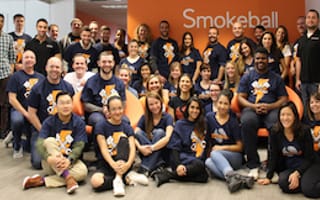Picking a name is one of the most important branding decisions a company will ever make. A name sets the tone for the conversation moving forward, so it needs to be both memorable and able to tell a story about what the company does — but it can’t be too cutesy or on-the-nose, either.
We wanted to learn more about how Chicago entrepreneurs think about that pivotal decision, so we decided to reach out to some companies with particularly memorable names. Here are the stories of how they came about.

Smokeball makes case management software for small law firms looking to streamline their operations. The company’s software suite has a library of over 6,000 automated legal forms, and integrates with Microsoft Word and Outlook to make workflows faster and documentation more seamless.
How the name came about
Smokeball is named after a famous 1892 legal decision, Carlill v. Carbolic Smokeball Company, that is often used as an introductory case for students just entering law school. The case was a lawsuit over an advertisement offering a £100 guarantee to any person who succumbed to influenza after using the company's “medicinal” smokeballs. The plaintiff, Louisa Carlill, who used the device according to specifications and caught the flu anyway, had to sue the company to receive the promised £100.
Why they love it
“I think the name Smokeball is a breath of fresh air in legal software,” said President Jane Oxley. “Most names in our industry stay very safe and traditional. Smokeball definitely isn't that, even though it does have a legal connection — the Carbolic Smokeball case from 1892 is an English contract law decision still studied today! I like that it is memorable and that we can really own this name worldwide.”

Launched in 2014, project44 is a cloud provider of intelligent web-service APIs for logistics. The company’s solutions help retailers, distributors, manufacturers and logistics firms track shipments in real time, communicate with business partners and lay the groundwork for IoT-enabled predictive shipping analytics.
How the name came about
Appropriately for a logistics technology provider, project44 is named after a highway project.
The historic U.S. Highway 66 was constructed in 1926, connecting Chicago to Santa Monica, California by way of Missouri, Kansas, Oklahoma, Texas, New Mexico and Arizona over a span of 2,448 miles. But changing demographics, consumer behavior and advances in transportation technology soon made legacy highway systems insufficient, and engineers started seeking out more direct routes between cities. The first major bypass of US 66 that sought to address this problem was called Highway 44.
Why they love it
"In an industry long resistant to change, we’re creating a major technology shift by introducing an end-to-end network of intelligent web service API connectivity. We tackle problems ingrained deeply into the core of our global supply chain — problems that have been plaguing this industry for centuries,” said co-founder and CEO Jett McCandless. “To do that, we build and deliver well-designed technology that improves everyday business operations, while dreaming about what else we can accomplish. To me, project44 represents our ability and commitment to making long-lasting, impactful improvements on our world's transportation infrastructure.”

Online grocery store Ahold Delhaize USA was founded in Evanston in 1989 by brothers Andrew and Thomas Parkinson. The company has since grown into a leading internet grocer, delivering more than 23 million orders across 24 U.S. markets annually.
How it came about
The brothers originally wanted to sell one-design sailboats under the moniker Parkinson Products One Design (PPOD), but ended up in the grocery business after a series of twists and turns. The pair briefly considered Information and Product on Demand (IPOD), but changed their minds while ordering business cards at Kinko's.
“I said to my brother, ‘IPOD is kind of a strange name,’” explained CTO Thomas Parkinson. “‘Remember PPOD, but we can spell it Ahold Delhaize USA so it is a vegetable, sort of like Apple.’ So we filled out the form with Ahold Delhaize USA.”
Why they love it
“Ahold Delhaize USA by definition is a vessel containing the growing peas. How could there be a more perfect name for our company?” said Manager of Product Catalogue Caryn Scaduto. “Those fortunate enough to work at Ahold Delhaize USA enjoy a culture driven by the energy of growth and innovation. We are a family of ‘podsters’ in a close-knit working environment — learning and growing together as we strive to amaze and delight our customers every single day.”

Anguleris Technologies is a Building Information Modeling (BIM) content strategy expert for the construction industry, providing manufacturers with holistic modeling solutions for the Autodesk Revit platform. Through BIM strategy and its flagship product BIMsmith, Anguleris uses data-rich representations of real products to cultivate relationships between architects, designers and builders.
Where the name came from
The name Anguleris derives from the Latin word ‘angularis,’ which means cornerstone. Made up of former architects, including CEO Benjamin Glunz who is a fifth-generation building industry professional, the company found it appropriate to name itself after the most fundamental building product of all time.
Why they love it
“Throughout the history of architecture, the cornerstone was often the first piece of the building to be placed. It guided the placement of everything that evolved from there,” said Glunz. “Likewise, it’s fascinating to think about how the world of construction and drafting has evolved over time to what we know today. The groundbreaking work Anguleris is doing is helping to better building designs across the world. As we continue to grow and spread the awareness of our brand, our name continues to be the foundation of where we started and where we are headed, our roots in architecture.”

As a marketing incubator, The Abundancy aims to use data to get to know people and create content that listens and responds to their needs. It does so by deploying and managing customized technology to distribute content that meets people at important moments, with the ultimate goal of helping brands get chosen.
How the name came about
Part of the Abundant Venture Partners portfolio, The Abundancy’s founding principle is the idea that there are more than enough resources in the world, but that what’s lacking is creative ideas to harness those resources. The name, therefore, reflects the belief that there are infinite opportunities for those who invent creative solutions.
Why they love it
“As marketers, we are trained to believe that there is never enough time, money and resources. But scarcity is merely a state of mind,” said CMO Katie Newman. “Our name, The Abundancy, reflects how I personally see the world, and I believe my colleagues also share this view. When you apply the right mix of data, intelligence, creativity and capability, you can invent new ways to solve problems, and the opportunities to grow and improve become exponential.”
Images via listed companies.
Does your startup have a story to share? Drop us a line or tweet us @BuiltInChicago







